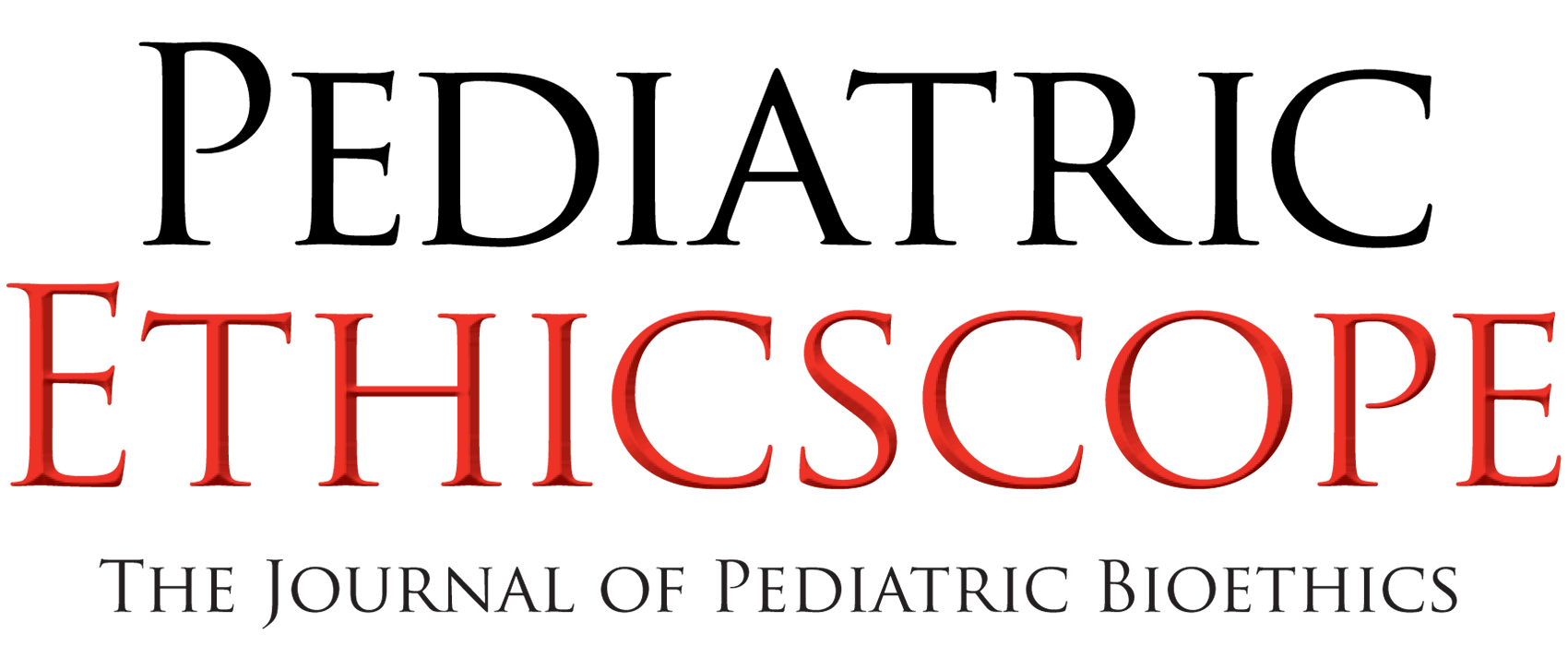
There have been some significant changes for Pediatric Ethicscope in the past year, the biggest being our relocation. In February, our journal offices moved from Children’s National Medical Center in Washington D.C. to Harvard Medical School (HMS), where we now receive support from the HMS Center for Bioethics. We are excited about the opportunities this portends. Announcing this issue in the Center for Bioethics newsletter resulted in nearly two hundred page views that same day. Pediatric Ethicscope will also be more proactive on social media—Twitter, Facebook, and LinkedIn; we will be promoting each article through each of those channels to reach a wider audience. For readers who may be interested, signing up for the Center for Bioethics newsletter will provide not just updates and new articles from Pediatric Ethicscope, but also for the HMS Bioethics Journal and a range of other topics and events in the field of bioethics. As always, the “subscribe” link on the main landing page will ensure you receive each issue as they are published.
Now to the Spring 2019 articles. While Pediatric Ethicscope does not publish theme issues, we do curate the article sets we publish. This often results in a common idea being highlighted. In this issue, that common idea revolves around expectations. Clinical trials involving neonates require protections beyond those typically needed for other types of participants due to the vulnerabilities involved—not just for the patients, but for their parents. We endeavor to prevent problems such as therapeutic misconception, but parents hold their expectations about their children’s health and wellbeing particularly dear. Jina Shah and colleagues explore these issues in Considerations For Informed Consent in Clinical Trials Involving Neonates.
Expectations come in many forms. One generally expects foster care to be necessary only in the absence of dedicated and loving parents or guardians; for Cat Pinnaro, acting in the best interests of her adolescent patient meant a recommendation for foster care despite the presence of a loving caregiver. A grandmother’s physical inability to perform the home care involved in managing her granddaughter’s condition challenged Pinnaro’s expectations regarding foster care placement. Unanticipated problems with carrying out that plan then caused her to reflect on those actions; had she done the right thing? The many unknowns involved in clinical decision-making can leave the correctness of those decisions under-determined. Sometimes, only by answering the question, “How did it work out in the end?” can we really know whether the expectations on which we based our decisions were ultimately valid. The case and outcome are described in Unintended Consequences of the Increasing Complexity of Home Medical Care.
Expectations regarding progress are almost always positive. “To progress,” such as through time or distance, doesn’t necessarily imply “to progress” in the sense of “to improve,” but in common usage those two meanings are conceptually fused. With that in mind, Matthew Alexander and Erica Carlisle analyze the role of clinical judgment in Ethical Analysis of Normative Biases In Data-Driven Medicine. They argue that while evidence-based medicine (EBM) comports well with clinical judgment, the “progress” in using data for clinical decision-making has resulted is a tendency for EBM to devolve into “data-driven” medicine, leaving physicians ill-equipped to manage care of patients with rare conditions for which data is not available.
Empathy and the Divide Between Medical and Patient/Family Worldviews is a narrative account of a young physician reflecting on his actions while standing in as a translator for another physician. Upon that reflection, Sebastian Proano concluded that in not being attuned to the natural expectations of two hopeful parents, he had failed to be properly empathetic. Without spoiling the ending, how Proano was received in light of his failure was altogether different than what he had expected to result.
Continuing the narrative format, Ada Moore recounts her experience as a junior nurse speaking out for the first time in Moral Courage in Practice. In hierarchal organizations, junior team members may harbor expectations that turn out to be, happily, wrong. The narrative is an excellent example of what should happen in situations where junior staff raise questions about the care being provided to patients.
This issue concludes with the winning paper of the 2019 Sanford Leikin Memorial Essay Contest in Ethics. This is an award established by the founder of Pediatric Ethicscope, Sanford Leikin MD, who did pioneering work in the area of pediatric assent. The subject of this essay is a practice infrequently discussed in bioethics, but one that remains controversial nonetheless. Clinical and Surgical Shadowing: A First-Person Account and Ethical Analysis explores the following, or ‘shadowing’ of a physician or nurse by a student seeking to learn more about the profession and practice of medicine. This serves to ensure the student knows what he or she is getting into before making the substantial financial and time commitments involved. Criticisms of the practice include expectations about privacy, confidentially, and the potential for coercion. These issues are explored, as are the question of unequal access to such opportunities, often by those groups from which medicine would like to recruit future practitioners.
The Sanford Leikin Memorial Essay Contest in Ethics is open to any authors who have not previously published work in a peer-reviewed journal. Submissions may address any subject in pediatric ethics. The submittal deadline is December 31st at midnight Eastern Standard Time (EST). Submissions are juried by our editorial team, and winning articles are published annually. Prospective authors may contact our office for further details. Our next issue will have a section devoted to suffering, and will include both essays and original research into the subject. We encourage you to share any feedback you have about this issue with us, and thank you for reading.
Blank
Blank
Tomas Jose Silber, MD, MASS
Editor-in-Chief
Blank
Stowe Locke Teti, HEC–C
Executive Editor
